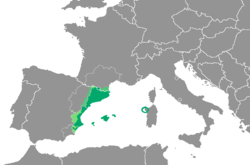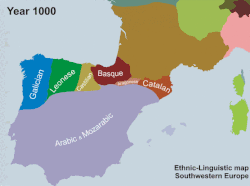Valencian language
Valencian (valencià) is the historical, traditional, and official name used in the Valencian Community (Spain) for the language spoken in this region.
| Valencian | ||||
|---|---|---|---|---|
| valencià | ||||
| Pronunciation | [valensiˈa] or [ba-] | |||
| Native to | Spain | |||
| Region | Valencia, Murcia (Carche) See also geographic distribution of Catalan | |||
| Ethnicity | Valencians | |||
| Native speakers | 2.4 million (2004)[1] | |||
| Language family | ||||
| Writing system | Catalan orthography (Latin script) | |||
| Official status | ||||
| Official language in | Spain:
| |||
| Regulated by | Acadèmia Valenciana de la Llengua | |||
| Language codes | ||||
| ISO 639-3 | – | |||
 | ||||
| ||||
In linguistics "Valencian" is also used to identify this distinctive variant spoken in central and southern Valencia which has gained its own currency within the Catalan domain.
Language or dialect?
The official authorities, which are the government of the Valencian Community and the Acadèmia Valenciana de la Llengua, accept Valencian as a dialect of Catalan. The Real Acadèmia de Cultura Valenciana and several associations disbelieve this opinion. They believe Valencian is a language in its own. They also accuse the official authorities of mixing Valencian with Catalan. This is done by approaching the Valencian ortography and grammar to the Catalan one.
Valencian Language Media
- Evolució del límit meridional del domini valencià-català.svg
Following the Reconquista, Valencian was spoken much further south than is currently the case, in a situation of bilingualism with Spanish. The latter then gradually imposed itself in many zones, with the limit between the two stabilizing around the mid-18th century.
- Coneixement del valencià (domini promig)-Cens del 2001.png
Knowledge of Valencian according to the 2001 census. The light green areas inland and in the southernmost part are not historically Valencian speaking (large).
- Catalan dialects-en.png
The main dialects of Catalan. The Western Catalan block comprises the two dialects of North-Western Catalan and Valencian.[4][5][6]
- Valencian vowel chart.svg
Vowels of Valencian, from Saborit Vilar 2009, p. 23
- Subdialectes del valencià.svg
Subdialects of Valencian dialect (in Catalan). Complement of dialectal map of Catalan language.
- RTVVexecutada.jpg
Employees demonstrate in front of the RTVV headquarters in Burjassot the day of its closure
References
| Wikimedia Commons has media related to Lua error in Module:Commons_link at line 62: attempt to index field 'wikibase' (a nil value).. |
- ↑ Míriam Luján; Carlos D. Martínez; Vicente Alabau, Evaluation of several Maximum Likelihood Linear Regression variants for language adaptation (PDF), Proceedings of the sixth international conference on Language Resources and Evaluation, LREC 2008,
the total number of people who speak Catalan is 7,200,000, (...). The Valencian dialect is spoken by 27% of all Catalan speakers.
citing Vilajoana, Jordi, and Damià Pons. 2001. Catalan, Language of Europe. Generalitat de Catalunya, Department de Cultura. Govern de les Illes Balears, Conselleria d’Educació i Cultura. - ↑ 2.0 2.1 Some Iberian scholars may alternatively classify Catalan as Iberian Romance/East Iberian.
- ↑ Wheeler, Max H. (2006). "Catalan". Encyclopedia of Language and Linguistics. Elsevier. ISBN 978-0-08-044299-0.
- ↑ Feldhausen 2010, p. 6.
- ↑ Wheeler 2005, p. 2.
- ↑ Costa Carreras & Yates 2009, p. 4.


